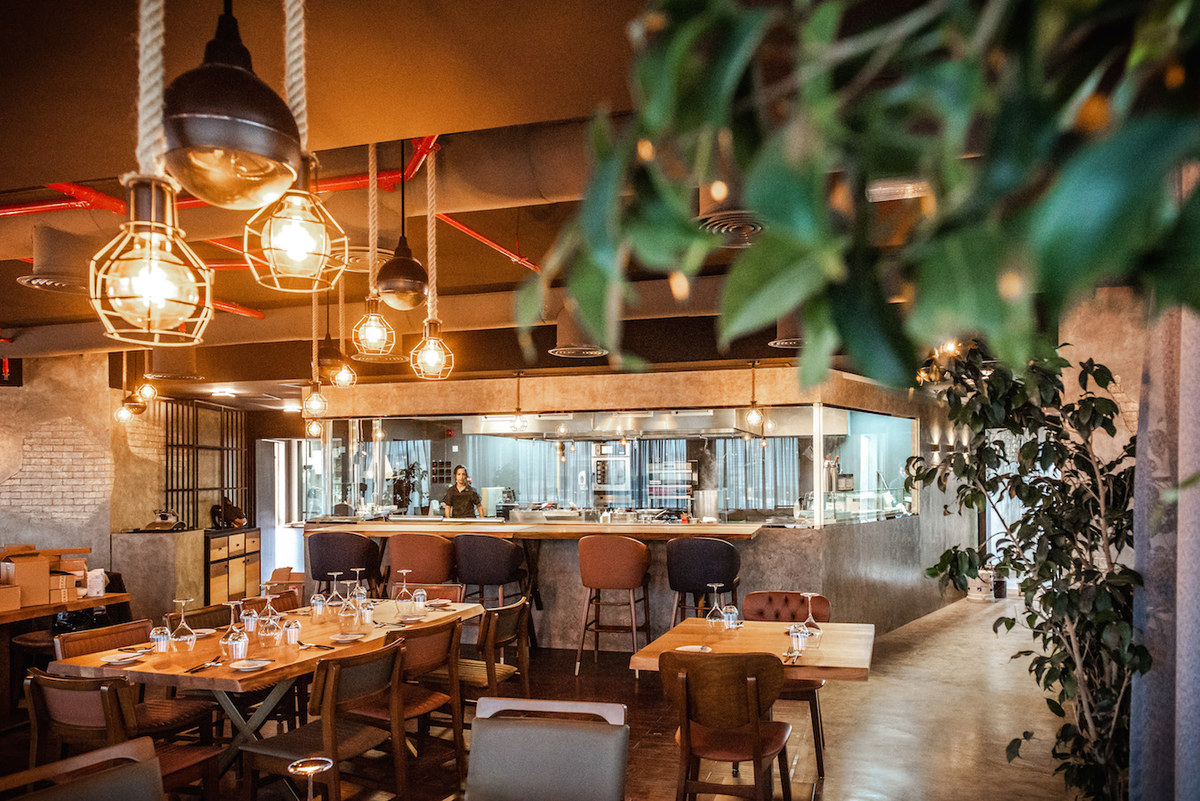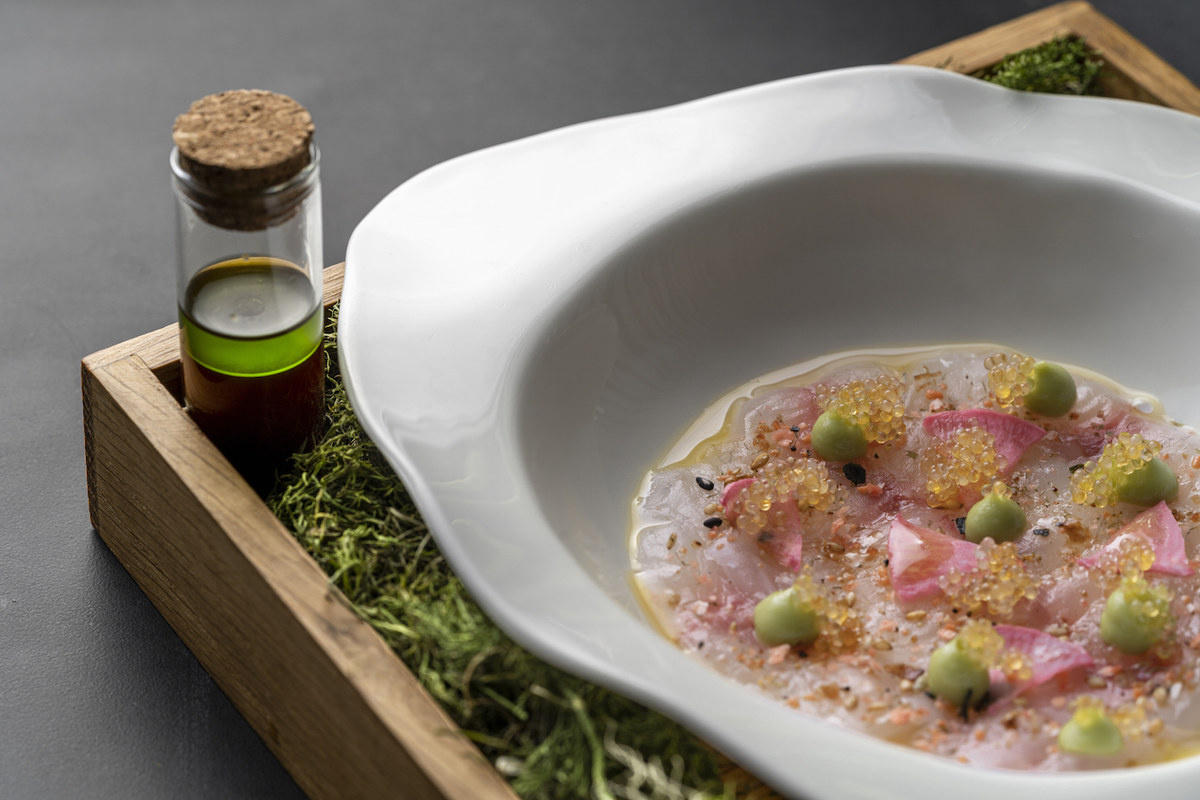TORONTO: For 33-year-old Tala Bashmi — chef patronne at Fusions by Tala in the Gulf Hotel, Manama — modernizing Bahraini and Khaleeji cuisine feels like a “responsibility.”
Bashmi grew up in Bahrain, and actually began her career at the Gulf Hotel, before heading to Switzerland to train at Grand Hotel Les Trois Rois and the Michelin-starred Prisma.

Fusions by Tala in the Gulf Hotel, Manama. (Supplied)
She returned to Bahrain in 2014 and worked her way up through the ranks at the Gulf Hotel to eventually head Fusions by Tala, where she’s determined to reinvent Gulf cuisine. She was recently named Best Female Chef in the Middle East and North Africa by 50 Best.
“I always saw a gap for a different version of Middle Eastern and Khaleeji cuisine,” Bashmi tells Arab News. “I want to compete on a global scale by elevating our cuisine technically, visually, and flavor-wise,” she says.
Here, Bashmi offers some advice and a delicious fish recipe to try at home.

Tala Bashmi's Seabream Carpaccio. (Supplied)
What’s your top tip for amateur cooks?
Don’t rush things. For the first two years of my career, I wasn’t even allowed to cook. It was purely preparation. I believe all young chefs should start that way and not jump the gun. When you rush things, you end up burning something. You (eventually) want to combine perfection and speed, but speed alone is not beneficial.
Also, there’s nothing more dangerous than a dull knife. A dull knife will slip and, most likely, cause injury. So, invest in a good quality knife and keep it sharp.
What's one ingredient that can instantly improve any dish?
I can think of a few. There’s olive oil. And invest in good salt — not iodized table salt! Whenever I travel, I always get salt that’s local to the region. I’m a firm believer in the fact that the simplest local ingredients can elevate or transform a dish.
What is your favorite cuisine?
Currently, it's Korean. The entire experience of making your own Korean barbeque is fun. With its fermented and pickled elements, it relies heavily on the traditional umami taste, which I enjoy a lot.
What is your favorite dish to cook?
I really enjoy cooking seafood, especially when it's fresh from the market. I love clams. I make a type of curry that has clams and local crabs in it, which you leave to simmer on the stove. When you cook all day, every day, you want to make your meals quick and tasty.
What’s the most difficult dish you prepare?
Desserts at the restaurant have a lot of elements and are relatively time-consuming. There is the cooking, chilling, setting, assembling, and layering. I’d say my lavender dessert — lavender sponge, blueberry jelly, white-chocolate mousse, and lemon crème brûlée — is the most difficult to prepare.
What are you like in the kitchen? Are you a disciplinary or are you more laid-back?
I was lucky enough to work under a second chef who showed me that you can be kind, gentle, and forgiving in this environment, without being disrespected. So, I follow his example. I don’t like to put people down because everyone learns differently. I want my team to feel happy, comfortable, and confident when they come into the kitchen. Patience and learning to deal with different personalities are important.
RECIPE: Chef Tala’s pan-seared faskar with vine leaf risotto
Ingredients
90g Faskar fillet; salt; pepper; 30g butter; 3g thyme; turmeric (optional); 150g of Arborio rice; 20g onion (finely chopped); 70g vine leaves; 10g lime juice; 10g parmesan cheese; cooking oil; vegetable stock or water
Instructions (fish):
Pat your fillets to dry them. Season with salt, pepper, and turmeric (optional).
Heat a non-stick pan to almost smoking point. Add 2 tbsp of oil per fillet.
Place the fillet (skin side) with a weight on top.
Cook for one minute, until skin is golden-brown.
Turn the heat to low, add thyme and 10g of butter.
The residual heat will finish cooking the fish (time depends on thickness of fillets)
Instructions (risotto):
On low-medium heat, melt 10g butter in a pan, add onion, sauté until translucent.
Stir rice into the mix.
And one ladle of veg stock (or water) at a time, making sure broth is fully absorbed.
Meanwhile, blanch the vine leaves in hot water for one minute or until softened. Finely chop.
Cook risotto for 20 minutes, stirring regularly. It should be al dente, but creamy.
Add remaining butter, cheese, vine leaves, salt, and lime juice.
Serve hot.












